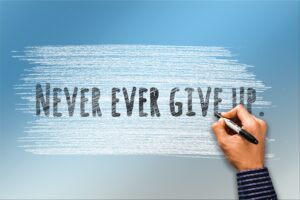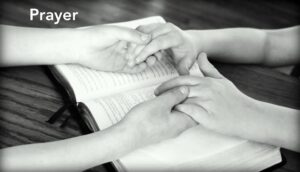Week 7
Courage
Goal
Understanding what it means to be courageous
- Understand how to get courage after trauma
- The relationship between courage and fear; courage and good; and courage and strength.
- To learn the secret of developing courage
 Joshua 1:9 - Have not I commanded thee? Be strong and of a good courage; be not afraid, neither be thou dismayed: for the Lord thy God is with thee whithersoever thou goest.”
Joshua 1:9 - Have not I commanded thee? Be strong and of a good courage; be not afraid, neither be thou dismayed: for the Lord thy God is with thee whithersoever thou goest.”
Psalms 27:14 - Wait on the Lord: be of good courage, and he shall strengthen thine heart: wait, I say, on the Lord.
The Courage of the Three Hebrews
The king of Babylon, Nebuchadnezzar, had a dream that he could not understand. In fact, he couldn’t even remember it, but he knew it was of great importance. His wise men and magicians could not make up an interpretation for the dream except they knew the dream itself. They proved themselves to be “phonies”, but a prophet by the name of Daniel was able to let the king know the interpretation of his dream. The God in heaven revealed the secret to Daniel of what would happen in the latter days, and he relayed that secret to the king.
“Nebuchadnezzar acknowledged Daniel’s God, saying, “Of a truth it is, that your God is a God of gods…and a revealer of secrets”(Daniel 2:47). But after some time passed, the king began to worship idols again. Because his dream consisted of an image, and the words “Thou art this head of gold” was said to him, Nebuchadnezzar decided to make a great golden image similar to the one in his dream. He made the head of gold visible to everyone in the plain of Dura, in the province of Baylon. “The thought of establishing the empire and a dynasty that should endure forever, appealed very strongly to the mighty ruler before whose arms the nations of the earth had been unable to stand”(Prophets and Kings, p. 504).
The statue was very impressive. Its height was sixty cubits, and the breadth six cubits.
Then an herald cried aloud, To you it is commanded, O people, nations, and languages,
And whoso falleth not down and worshippeth shall the same hour be cast into the midst of a burning fiery furnace”. Daniel 3:2-6.
All but the three Jewish young men named Shadrach, Meshach and Abednego fell down and worshiped the golden image. These young men had high ranking positions in Babylon, but they regarded the God of heaven above the king who had employed them. Those who reported to the king of their failure to worship the golden image that was set up brought them before the king. “Nebuchadnezzar spake and said unto them, Is it true, O Shadrach, Meshach, and Abednego, do not ye serve my gods, nor worship the golden image which I have set up? Now if ye be ready that at what time ye hear the sound of the cornet, flute, harp, sackbut, psaltery, and dulcimer, and all kinds of musick, ye fall down and worship the image which I have made; well: but if ye worship not, ye shall be cast the same hour into the midst of a burning fiery furnace; and who is that God that shall deliver you out of my hands?” (Daniel 3: 14, 15). When Shadrach, Meshach and Abednego refused to yield to the king’s order, he became so angry that he commanded that the furnace be heated seven times hotter.
The three men were bound and cast into the middle of the furnace. But Nebuchadnezzar did not get the satisfaction that he had expected. To the king’s surprise, the young men were unharmed in the midst of the fire. In fact, there were four men loose, walking in the middle of the fire, and Nebuchadnezzar recognized the fourth person as the Son of God. Rest assured, the king had no superior knowledge to come to this conclusion. The young men had already been witnessing to the king, as well as those around them, of their God. Now, Jesus had come in person to protect Shadrach, Meshach and Abednego from certain death, and to give evidence that the Most High rules in the affairs on the earth.
Amazingly, all “the princes, governors, and captains, and the king's counsellors, being gathered together, saw these men, upon whose bodies the fire had no power, nor was an hair of their head singed, neither were their coats changed, nor the smell of fire had passed on them” (Verse 27). It must have been surreal. Above all, they witnessed the courage of three men who calmly faced the furnace, trusting that whether or not God would have delivered them, they would choose to exalt His name by remaining loyal to Him.

- Bigotry (hatred) towards to Christians widely exists today and has been through the ages. Why do you think this is so?
- Isaiah 43:2 says, “When you pass through the waters, I will be with you; And through the rivers, they shall not overflow you. When you walk through the fire, you shall not be burned, Nor shall the flame scorch you.” What does this promise mean?
- In the hour of trial, Shadrach, Meshach and Abednego remembered the promise in Isaiah 43:2. What does this promise mean to you?
- How important are God’s promises for all of life’s issues?
- In the latter days (the time shortly before the second coming of Jesus), those who obey the fourth commandment and honor the Sabbath rather than Sunday, a man-made worship day, will be sentenced to death. How is this similar to the story of The Three Hebrews?
- How effective was the witness of the three Hebrews to the whole nation?
- Why should obedience to God be above obedience to a king, president, other important person, or even a parent or teacher?
- The God of the Hebrews has proved to be the God of all gods. Why does He deserve your worship?
 Courage is power in the aftermath of trauma. It takes courage to recover from a traumatic experience. Courage is strength in the face of pain or grief. Courage allows individuals to face adversity, usually extremes in either physical, mental, or emotional situations, without fear. It does not require you to be outgoing or willing to take huge risks. Courage means you can survive whatever painful or traumatic situation you are experiencing.
Courage is power in the aftermath of trauma. It takes courage to recover from a traumatic experience. Courage is strength in the face of pain or grief. Courage allows individuals to face adversity, usually extremes in either physical, mental, or emotional situations, without fear. It does not require you to be outgoing or willing to take huge risks. Courage means you can survive whatever painful or traumatic situation you are experiencing.
Trauma may cause many children to be shy, reserved, and afraid. Being courageous may be foreign to how they live their lives; yet this trait is essential to face the world. After trauma, parents may find themselves cuddling, spoiling, or staying around their children more, determined to protect them from that experience again. But the truth is that every child who survives any trauma is already an act of courage. Adults cannot completely protect children from enduring hardships. Life will consistently challenge them. Inevitably, they will encounter mean and evil people as they navigate life. They will have fear. However, they can learn how to become courageous in order to overcome trauma.
What is courage?
The word courage appears in the Bible 26 times, and 16 times the word states the need to be of “good courage.” ” For example, Joshua 1:9 states, “Have not I commanded thee? Be strong and of a good courage; be not afraid, neither be thou dismayed: for the Lord thy God is with thee whithersoever thou goest.” Psalms 27:14 says, “Wait on the Lord: be of good courage, and he shall strengthen thine heart: wait, I say, on the Lord.” Based on these verses and other Bible passages, courage can be understood in the context of fear and strength. The word is also used in relation to that which is good.
Courage destroys fear
Fear is at the core of most cases involving anxiety, and courage may be the antidote. Courage is the willingness to respond fearlessly despite the anxiety and worry one may feel. Children who lack courage and live in fear and anxiety struggle to move forward, try new things, speak out, and make friends. Meanwhile, learning to be courageous allows them to take chances, pursue opportunities, and allow God to use them. Their courage helps them take action despite the fear they feel. One of the best ways children can learn to live courageously is by knowing how to refuse to allow fear to paralyze them from doing what is right.
Courage is not the absence of fear. True courage is being terrified beyond belief, but stepping forward nonetheless. It is taking that leap of faith despite not feeling capable or adequate. It also trusts that God is omnipotent, omniscient, and omnipresent and can remove the fear that keeps one from taking action. As children develop their faith and trust in God, fear dissipates. While it is possible for children’s fear to be removed immediately upon trusting in God, sometimes the fear slowly diminishes over time as they move forward and take courageous steps.
Courage builds strength and confidence
Children who experience trauma can develop unhelpful neural pathways over time that trigger negative thoughts and create a feeling of nervousness when confronted with a stressful event. The more they engage in an unhelpful neural pathway, the stronger it gets. Similarly, the less we engage in an unhelpful neural pathway, the weaker it gets. Courage, however, can be viewed as a muscle. The more it is used, the stronger and more manageable it is for the mind and body to do the next courageous thing. When children develop healthy responses to something that otherwise leads to fear and anxiety, they establish a healthier neural pathway.
The Lord wants to help children overcome their fears. He sometimes uses experiences or situations where they would have to exercise courage to build their strength and confidence. As fear is overcome, the Lord gives courage to do small and great things. With each victory, it becomes easier for them to do more courageous things in the future. As such, children need to be reminded continuously that they must rely on the Lord to give them the strength to do courageous things.
Being courageous in life will help children to respond appropriately to life’s demands and accomplish positive things. However, it takes work to move from fear to courage. Being courageous is about thinking things through, following God’s command by faith, examining the benefits of walking in obedience, and acting despite the fear that inevitably sets in. It’s important to realize that courage is not necessarily the absence of fear, but moving forward with faith and believing in the best outcome.
Good courage encourages good thoughts and actions.
Ever wonder what is so good about courage? Here are a few benefits of having good courage. When children make courage a part of their lives, it helps build their confidence. Embracing courage allows them to see the world differently and makes them more well-rounded. It also equips them with the ability to step out of their comfort zone. Moreover, being courageous makes them more prosperous because they are more likely to seize opportunities as they present themselves. In addition, embracing courage has the tendency to increase a sense of happiness.
The secret to developing courage and implementing it.
Courage does not manifest itself the same way in children in every circumstance. For some, it may be simply getting the courage to ask a teacher for help. For others, it may mean getting in front of the class to preach their first sermon. Courage may mean to control the desire to, or avoid saying, doing, or eating something harmful. However, the secret to developing and strengthening courage is the same for everyone. The secret is prayer. Without prayer, the enemy will present the situation as impossible or too difficult, and his temptations will weaken faith and destroy courage. “Satan is constantly working to unsettle the faith and destroy the courage and hope of every one” AH 110.3.
Prayer will help children to maintain a healthy perspective on what might hold them back. Research shows that when feelings are put into words, it helps curb negative responses to fear. Voicing fears in the form of prayer is even more powerful. It does not make one weak. Instead, it makes them brave. After all, it is not always easy for children to acknowledge where they are vulnerable. So, if they can acknowledge their fears in prayer, they are one step closer to being courageous. Consequently, rather than minimizing fear or denying it exists, they recognize what is holding them back when they pray. Through prayer, God will empower them with His help to be courageous despite fear.
Prayer helps to reduce the stress that may come with fear. Sometimes children experience fear or feel like they lack courage simply because they are exhausted, and the thought of doing anything more seems too overwhelming. However, if they feel overwhelmed, distressed, or bogged down, they are to look to God in prayer. He can relieve the stress. It’s hard to feel courageous when they are stressed out. Consequently, praying will give them the necessary pause to breathe and reduce stress. When they feel too overwhelmed with the thought of trying to be more courageous, it could be that they first need to stop and pray to reduce the stress surrounding the situation.
Courage is developed with intentional effort. But good courage cannot be developed with any innate power. Prayer is key to empowering children with courage and strength, as well as allaying fears they may have, in order to handle life’s challenges.

- In your own words, what is courage?
- What is the most courageous thing you’ve ever done?
- Who is the most courageous person you know, and why?
- Have you ever seen someone being bullied and wish you would have said something? Please share the story.
- What did you do instead of lending assistance? What do you wish you had done?
- How do people demonstrate that they are courageous?
- What is something you can do today to demonstrate that you are courageous?
- How do you think Jesus can help you to build courage?

- Bigotry: hatred
- Inevitably: as is certain to happen; unavoidably
- Latter days: the time shortly before the second coming of Jesus
- Neural pathway: a series of connected neurons that send signals from one part of the brain to another.
- Phonies: persons who practice deception
- Surreal: unbelievable

Activity 1
Materials needed: Prayer journal, Bible, pen/pencil
Youtube: Bach classical music for relaxation
Planning and Writing your Prayer
- Pray that God will help you to identify one or two areas in your life where you have challenges. It may be a fear of something or someone, a repeated negative thought, a bad habit, or a good habit that you need to develop. You can literally say David’s prayer in Psalm 139:23 which says, “Search me, O God, and know my heart: try me, and know my thoughts: And see if there be any wicked way in me, and lead me in the way everlasting.”
- While classical music is being played, think deeply about problems you may already know about and jot them down in your prayer journal. If nothing comes readily to your mind, think prayerfully about what challenges you should be addressing and note them.
- Feel free to tell God what solution may be good, and then tell Him to handle the problem.
- Write a prayer in your prayer journal. Address God as your Father in heaven, since there are many false gods. Begin your prayer with a praise like “Great is the Lord, and greatly to be praised; and his greatness is unsearchable” (Psalm 145:3). You can pray God’s Word back to Him to build your confidence and faith in Him. For example, Ephesians 3:20 says, “[God] is able to do exceeding abundantly above all that we ask or think”. End your prayer by thanking God for the answer that He will provide. Thank Him also for past blessings.
- When this class has come to an end, continue to thank God for answering your prayer as you pray.

Dear Father in Heaven, Jesus was a very courageous man when He lived on this earth. Please help us to be courageous like He was daily. Help us with the things that we have to do that seem hard and fearful. Help us not to be afraid to do what is right. Your Word tells us that all things are possible. Show us how to live in faith and to believe that you will give us the strength we need to get things done. In Jesus’ name, we pray. Amen.


